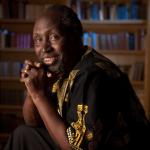The first year after Callum died, Mira felt like her body kept moving only because no one had informed her soul it was time to stop.
Every Sunday morning, rain or shine, she packed a thermos of strong coffee and a bag of Callum’s favorite biscuits and walked to the cemetery at the edge of the sleepy town of Maplewell. There, beside the cedar tree where the wind always hummed low, she would sit cross-legged in front of the slate stone that bore his name. Her visits became a ritual: trimming grass with the shears he once used in the garden, brushing away dead leaves, placing a new bunch of wildflowers she picked along the old train tracks.
"You wouldn’t believe the price of petrol this week," she’d mutter, sipping her coffee. "If you'd just waited a year or two, we could've finally bought that campervan."
These conversations, one-sided though they were, gave her shape and rhythm. The silence in her house was too dense otherwise.
It was on one of these Sundays, maybe four months in, that Mira noticed the grave to the right of Callum’s seemed a bit neglected. The headstone was small, its engraving faded:
Isla Rowan Bellamy 1983 – 2018
There were no flowers, no mementos, no sign that anyone came by. Mira crouched beside it, brushing dirt from the carved letters. Isla. A name like windchimes.
"Sorry about the mess, love," Mira whispered. "I imagine you and Callum are decent neighbors, at least. He always kept a spare cup for strangers."
The next weekend, she brought an extra bouquet.
One Sunday became ten. Then thirty. Mira tended to Isla’s grave as tenderly as she did Callum’s. She planted purple hyacinths. She added a candle during Samhain. She even placed a tiny iron sparrow on the stone—a trinket Callum had once picked up at a street market in Brighton.
Three years passed like pages in a windstorm.
It was early spring when she first saw the man.
He was standing before Isla’s grave, tall but stooped, with a denim jacket that had seen better decades. The scent of cigarettes hit her before she heard his hoarse cough. He turned as she approached, revealing a deeply lined face, reddened around the eyes, like he'd run out of sleep years ago.
"Hi," Mira said gently. "Sorry, I didn’t mean to interrupt. I just—I usually come on Sundays. I didn’t think anyone else ever did."
The man looked at her, eyes scanning for judgment. When he found none, he offered a weary nod.
"She’s my sister," he said. "Was. Isla. I haven’t been... around."
Mira didn’t pry. She simply nodded, folded her hands.
"She’s had good company. My husband’s just here," she gestured. "Callum. He was a listener."
The man swallowed. Then sat down, right there in the grass. He looked at Isla’s grave like it had just spoken back.
"I’m Gabe," he said finally.
That afternoon, they sat in silence, then in halting conversation. Gabe told her Isla had been the baby of the family, stubborn and loud and brilliant. That he’d disappeared into a string of bad choices and bottle bottoms, and by the time he reached the surface, it was too late. Isla had died. No one told him where. Or when.
"I went to rehab twice," he said. "Didn’t take. The third time stuck, but by then... my parents were gone too. It’s just me now."
Mira felt something shift. Not pity, not even sympathy. Just the quiet ache of recognition.
The following weekend, Gabe returned. This time with a plastic bag of gardening tools, still with the price tags attached. He knelt beside Isla’s grave and started pulling weeds.
They became a pair of odd custodians, Mira and Gabe. They watered, pruned, and talked. Sometimes they brought sandwiches. Sometimes silence. Over time, Gabe began to look less like a ghost. He quit smoking. His hair grew less unruly. He found work repairing old boats on the coast. Then a flat above the bakery.
One weekend in October, he brought Mira a scarf.
"It’s ugly," he admitted, laughing. "But it’s warm. Got it on sale."
Mira laughed too. And when their hands touched, it felt less like a fluke and more like a choice.
By the next spring, they were sharing more than just graveside stories. They spent Saturday evenings making dinner together, Mira showing Gabe how not to burn garlic, Gabe teaching Mira to play gin rummy without mercy. The laughter returned to Mira’s life like birdsong after a hard winter.
"You think they’d approve?" Gabe asked one day, nodding toward the graves.
Mira looked at Callum’s headstone. Then Isla’s. She smiled.
"I think they had a hand in it."
The day Gabe proposed, they stood between the graves with a small picnic basket and two mugs of coffee.
"We’re not trying to replace them," he said. "Just building something beside what was lost."
Mira said yes.
They married in the spring under the cedar tree, surrounded by friends, a few wildflowers, and the souls who had quietly brought them together.
Sometimes, Mira would still catch the scent of smoke when Gabe hugged her. It didn’t bother her anymore. It reminded her that people could change. That broken things could be made into mosaics. That grief didn’t always mean an ending.
It could, sometimes, lead you straight to a beginning.











